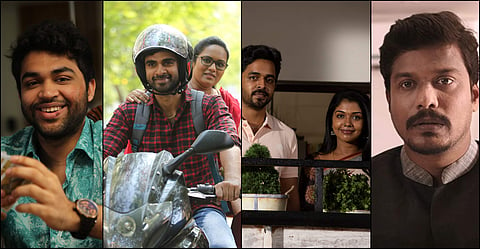Sila Nerangalil Sila Manidhargal Movie Review: A heartwarming exploration of guilt, rage, and atonement
Rating:(3.5 / 5)
Sila Nerangalil Sila Manidhargal could have been many films. With three angry young men at the centre, it could have been a masala revenge thriller. With a self-indulgent consumerist for one of the protagonists, it could have been a compelling slice-of-life drama. The romance tracks could have made it an exploration of love in two contrasting milieus. There is even a dark comedy hidden in the story of a blue-collar employee whose attempts to turn white-collar are met with opposition. It is to director Vishal Venkat’s credit that he takes all the right paths in making his debut film, Sila Nerangalil Sila Manidhargal.
Direction: Vishal Venkat
Cast: Nasser, Ashok Selvan, Rishikanth, Manikandan, Reyaa, Ilavarasu, Bhanupriya
There are four storylines in Sila Nerangalil Sila Manidhargal, with all four primary characters being driven by anger. We have Vijay (Ashok Selvan) sharing a rather loving even if infuriating equation with his father, Selvaraj (Nasser), and fiance, Malar (Reyaa). There is Rajasekar (Manikandan), a housekeeping executive at a high-end resort, frustrated with his efforts not being recognised. A materialistic IT employee, Praveen (Praveen Raja), is incensed about his wife Kayal (Riythvika) not being aware of how her “simplicity” affects his status in society. Finally, we have a debutant actor Pradeesh (Abi Haasan), irked about living in the shadow of his famous filmmaker father, Arivazhagan (KS Ravikumar). Vishal takes his time to acquaint us with the storylines before they all converge in a heart-wrenching moment. In many ways, Sila Nerangalil Sila Manidhargal functions like the hyperlink version of Netflix’s Navarasa. The deliberate pacing in this 140-minute-long film allows us to empathise with each of the stories and allows the characters the space to go through the nine rasas before they finally find peace.
Although Sila Nerangalil Sila Manidhargal can be compared to hyperlink films like Super Deluxe and Maanagaram, I see this film being akin to something like Vaanam or the Malayalam film, Traffic. The plots stand on their merit despite the effective convergence, and the decision to have this crisscrossing of worlds right at the midpoint of the film is a smart decision. After the time we spend understanding the worlds of the leads, we see them all unravel one after the other.
What really holds the film together, apart from the smart writing choices, is the casting. Ashok’s Vijay and Manikandan’s Rajasekar are brilliant as two perennially angry people whose actions result in overwhelming guilt. The solitary interaction between these two characters is a treat to watch. Nasser is the standout performer in a film brimming with top talents, and Ilavarasu, in a cameo, matches the former in every way. Special mention to Rishikanth, who plays Vijay’s friend, and aces a role that requires him to be sad but not too sad, and angry but not too angry.
As the transition from rage to guilt to redemption is more pronounced in the stories of Vijay and Rajasekar, the tracks of Pradeesh-Arivazhagan and Praveen-Kayal feel rather underexplored. Vijay and Rajasekar are from the lower-middle-class strata, while the other protagonists exist in the urban elite space. The film too spends more time on the former two, and in turn, we understand them better. In the latter, we get glimpses and checkbox character traits, and even the emotional investment in their plights remains superficial.
This isn’t to say that those storylines don’t have merits. The strong undercurrent of humour in the Pradeesh-Arivazhagan story (featuring Anju Kurian in a hilarious cameo) works, and so does the way in which Praveen’s pompousness is dealt with. Vishal’s writing (with dialogues by Manikandan) ensures that we don’t overstay on any particular emotion. This facet is best showcased in the buildup to the poignant interval block where the smiles and fun get interspersed with tension and thrills. Be it the commentary on the superficiality of social media and the relentless trolling or the empathy that is sought for characters who fight an inner battle between fear and self-disgust, the impressive writing delves into a gamut of emotions, and comes out largely unscathed.
Sila Nerangalil Sila Manidhargal is ably supported by Radhan’s music, even if there are times when the background score gets too coercive, and Meyyendiran’s cinematography which captures South Chennai in its natural glory. Prasanna’s editing that manages the multiple storylines, is a strength too.
Sila Nerangalil Sila Manidhargal has a lot going for it even if there are a few missteps along the way. As the credits rolled, and the tears dried up, I felt that the film achieved its purpose of reminding us to enjoy the little pleasures in our life, say our apologies, and live our lives a bit more wholesomely, before it is too late. Also, this film is an example of the talent Tamil cinema has at its disposal; let’s hope then that they too get well-utilised before it is too late.

